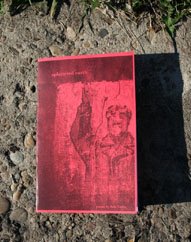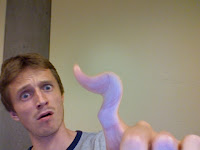5:10 PM. I'm late. Unlike at home in Canada, I don't have to worry about scrambling into my soccer gear - in Ghana the heat forces you to wear shorts and a t-shirt at all times, and shin pads or cleats would get you laughed off the pitch. I burst out the door and wind my way along dusty roads to the pitch, past my neighbour's ramshackle houses and humble streetfront shops. A few people wave on the way, though the site of a lanky, sweating obruni ("foreigner" in a local language) no longer surprises as it did only a few months before. I round the corner and the game has already started. The players know that there is only a brief moment each day when the temperature is low enough (under 35°C) to play, and they aren't about to waste a minute of that time. I squat on a concrete block on the sideline, waiting to be subbed in. The ball, a dull orange, half-deflated "sports ball", is already caked in its usual thick layer of grime, as three sides of the pitch are lined with open sewers.
5:15 PM. Arriving late often results in an evening on the sideline, as the subs can sometimes outnumber the players five-fold. Today, however, I'm in luck, and the numbers are low. "Crouch! Crouch!" yells one of the players, waving me into the game. (Soon after my arrival in Ghana, I acquired the nickname “Peter Crouch,” after the Liverpool striker, a name which they assured me referred only to my pasty whiteness, and not to my facial features. I pretended to believe them.) The pitch is small and the pace is frenetic. A cloud of dust whirls around the ball as it is chipped into the air, then travels off the feet, chests and foreheads of three players before bouncing off the cinder-block goal post and in.

I flail about in my attempt to keep up, though this proves impossible. There is no time to stop and think; there are no set plays in this game. It is all speed and imagination, two things which I was left lacking in from my Canadian soccer training.
When finally the ball arrives on my foot, three voices are already shouting. Everyone is always open, and every pass is possible. I move the ball conservatively back to the keeper, much to the chagrin of my three streaking teammates. The keeper, in turn, lobs the ball deftly down the length of the pitch, as if to show me how to do it. One of our strikers quickly gathers it in and drills it through the goalposts. Generously, they give me partial credit for the goal as they trot back, grins slathered across their faces.
5:35 PM. Twenty minutes in and already two goals. I am half-blind from the sweat and dirt. My legs and arms are covered with a thick layer of sewage and dirt. My skin is still white enough, however, to get the occasional “Crouchy!” call from the primary school kids who line the edges of the pitch.

They come every week to watch and hope, though they rarely play. I am gasping for air and sub one of them in – eleven years younger and two feet shorter than myself, I’m still rather confident that he’ll outperform me. His name is Peter, and though slightly bitter that I showed up and stole his nickname, he forgives me a little more every time I sub him in. Immediately, he is off and running, throwing himself against opponents and chasing down every loose ball. He knows that, as a twelve-year-old amongst adults, he has little time on the pitch to prove his worth, and he takes advantage of what’s given to him.
5:45 PM. I sub back in. Miraculously, Peter is still on the pitch, beaming like a headlight. The crowd ripples with laughter, as our team’s offensive attack now consists of the two Crouches – a white guy and a child. The opposition whets their lips with anticipation; they have been waiting all game for a goal, and now see it all but ensured. Peter, though, has other plans. Lifting the ball onto one foot, he flips it over the head of his six-foot defender and slips past him. Wiping the sweat from my eyes, I stumble after the play. Three defenders converge on little Peter – they’ve clearly decided who the offensive threat is on our team. Cornered, he butts the ball off his heel, back to my waiting foot. I’ve learned my lesson, and go straight for the goal. The kick is clumsy, but it gets the job done. 3 – 0. Peter’s face explodes, all white, chiclet teeth. The celebration is abbreviated, though. Peter is subbed out and the ball is tossed back into play, the opposition more determined than ever. Peter doesn’t seem disappointed, he knows he’ll be able to play a few more minutes tomorrow.
6:00 PM. The sun has almost disappeared over the horizon. The score is 3-1, and our opponents agree, begrudgingly, to call the match. Almost immediately, the pitch is empty; the lack of streetlights encourages quick exits. The sun will be back tomorrow, though, and the pitch will be waiting.
For now, we return, contented, to our homes. I take an ice-cold shower; watch as clods of dirt spin and dissolve in the drain. Peter lays in bed, his head swirling with possibility. Slowly, the city, the continent, goes to sleep.
from the July 2007 issue of Free Kick Magazine
 marta and i are heading away for a few days on the gulf islands, which means i won't be able to respond to the dozens of requests i receive daily for my year-old chapbook splattered earth.
marta and i are heading away for a few days on the gulf islands, which means i won't be able to respond to the dozens of requests i receive daily for my year-old chapbook splattered earth.




